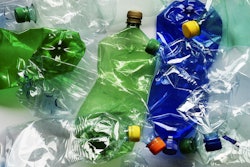Why? Because packaging, the industry I’m a part of, has to some degree made it possible for mindless cretins to diminish our environment by allowing their trash to foul our beaches. Somehow I find myself feeling it’s my responsibility to repair some of the damage they do.
Packaging turning to trash is a behavior issue. It isn’t some sort of foregone conclusion. Packaging professionals have for years engaged in an effort to reduce superfluous packaging, and in concert with state laws on recycling and bottle deposits they have greatly reduced the amount of trash generated from packaging. But as long as people choose to behave badly, even the best designed package can still end up on the roadside or beach.
On the beach that I walk, the most common material is Expanded Polystyrene (EPS) from two sources: coffee cups and boating products that favor EPS because it’s a lightweight yet rigid material that floats.
Here was my take on a recent walk: 78 pieces of EPS ranging from 2 mm to 44 cm, 5 bottle caps, 10 partial bottle caps, 1 PET water bottle, 4 plastic bottle neck ring carriers, 8 tear-off pouch tops.
For comparison I stopped at a roadside park that had picnic tables and took an inventory of packaging trash on the ground there: 5 bottle caps, 7 tear-off pouch tops, 2 water bottles.
I also sampled a beach on an inland lake: 1 EPS food container, 2 beer cans, 1 cigarette pack, 1 HDPE shopping bag.
What I am noticing in my survey of items picked up at different locations is that the tear tabs on flexible packages seem to be an increasing item. Flexible packages are also being found, but probably in the same number as bottles in years prior. Crown closures on bottles are replaced by plastic closure systems that float and end up on the beaches.
Here’s what I would suggest to reduce some of this blight:
• Raise the bottle deposit nationally to 10 cents.
• Include water bottles in the deposit laws.
• Reduce the use of EPS on disposable items.
• Design flexible pouches to have openings that DO NOT tear off but remain part of the main pouch.
• Design bottles with some type of means to lock the cap with the bottle.
In the meantime, it seems to me that each of us working in the field of packaging should be more proactive when it comes to trash. I propose that when we go to the beach or camping or walking through town and see a piece of trash that someone has left, we should take the initiative to pick it up. Don’t get hung up on whether it’s beneath your dignity to do so. Instead, view it as an act of environmental preservation that will help ensure that our children have a safe and clean environment. I guarantee you will begin to appreciate the enormous value in this simple act.
Fritz Yambrach ([email protected]) is director of packaging at San Jose State University.
























